Score Orders
Scores and performance materials, both printed and as pdfs, are available for sale on request. Please email info@stephengorbos.com for all inquiries.Find Stephen on:
Join the mailing list:
Category Archives: News
New Recording: Such sphinxes as these
Such sphinxes as these obey no one but their master, my new vocal octet and longest title to date, was premiered last week by the inimitable Brad Wells and Roomful of Teeth. Click here to listen to the performance and read more about the piece. Special thanks to the Beinecke Library at Yale University, who, along with hosting the concert, put the Voynich Manuscript on display as part of their current manuscript exhibition.
Such Sphinxes as These: Composing the Voynich
I just finished a new piece for Roomful of Teeth, an amazing vocal octet led by conductor Brad Wells. Inspired by the Voynich Manuscript, my piece makes use of several of the non-Western vocal production techniques that the group specializes in (yodeling, throat singing, and overtone singing). What follows is a lengthy program note: hopefully it will inspire a few readers to come check out the premiere in New Haven in a few weeks! Pics of the Voynich Manuscript courtesy of the Beinecke Library at Yale.
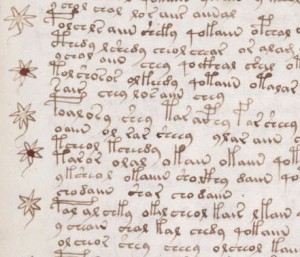 The Voynich Manuscript has piqued human interest since it first surfaced at the court of Emperor Rudolf II in the late 16th Century. (Radiocarbon dating completed in 2011 has dated it to the early 1400’s.) The manuscript’s florid script has remained completely indecipherable: perfectly legible (and resembling some western scripts of the period), the characters that make up the script do not add up to any known language. Indeed, it’s the lavish illustrations (present on every page, some of which foldout to the size of several pages) that have led to the general consensus to label some sections as herbals, astronomical, biological, cosmological, pharmaceutical, and recipes. Like the script, the illustrations have also resisted complete explanation: the plants in the herbal section are like none found on this earth; likewise, the astronomical charts do not belong to anything in our heavens charted by astronomers. These curiosities have prompted some to theorize that the Voynich is nothing more than an elaborate hoax, likely made by alchemists looking to extort money from Rudolf II. Yet some of the foremost minds in cryptology, from the 16th c. to the present day, believe that the text is an elaborate code. Linguists have found that the ordering and frequency of characters in the script have all the qualities of language; analysis of the writing reveals it to be in the hand of someone practiced at writing this script fluently. Some believe it to be in a hybrid language, because of some similarities in morphology to language families in East and Central Asia. Others claim that the text is an example of transcribed glossolalia, or even that the book was deposited on our planet by aliens. The Beinecke Library at Yale, where the manuscript has been part of the collection since the 1960s, gets regular requests from individuals wishing to ingest pieces of the manuscript (or, in some cases, just lick), inspired by a belief in its healing properties.
The Voynich Manuscript has piqued human interest since it first surfaced at the court of Emperor Rudolf II in the late 16th Century. (Radiocarbon dating completed in 2011 has dated it to the early 1400’s.) The manuscript’s florid script has remained completely indecipherable: perfectly legible (and resembling some western scripts of the period), the characters that make up the script do not add up to any known language. Indeed, it’s the lavish illustrations (present on every page, some of which foldout to the size of several pages) that have led to the general consensus to label some sections as herbals, astronomical, biological, cosmological, pharmaceutical, and recipes. Like the script, the illustrations have also resisted complete explanation: the plants in the herbal section are like none found on this earth; likewise, the astronomical charts do not belong to anything in our heavens charted by astronomers. These curiosities have prompted some to theorize that the Voynich is nothing more than an elaborate hoax, likely made by alchemists looking to extort money from Rudolf II. Yet some of the foremost minds in cryptology, from the 16th c. to the present day, believe that the text is an elaborate code. Linguists have found that the ordering and frequency of characters in the script have all the qualities of language; analysis of the writing reveals it to be in the hand of someone practiced at writing this script fluently. Some believe it to be in a hybrid language, because of some similarities in morphology to language families in East and Central Asia. Others claim that the text is an example of transcribed glossolalia, or even that the book was deposited on our planet by aliens. The Beinecke Library at Yale, where the manuscript has been part of the collection since the 1960s, gets regular requests from individuals wishing to ingest pieces of the manuscript (or, in some cases, just lick), inspired by a belief in its healing properties.
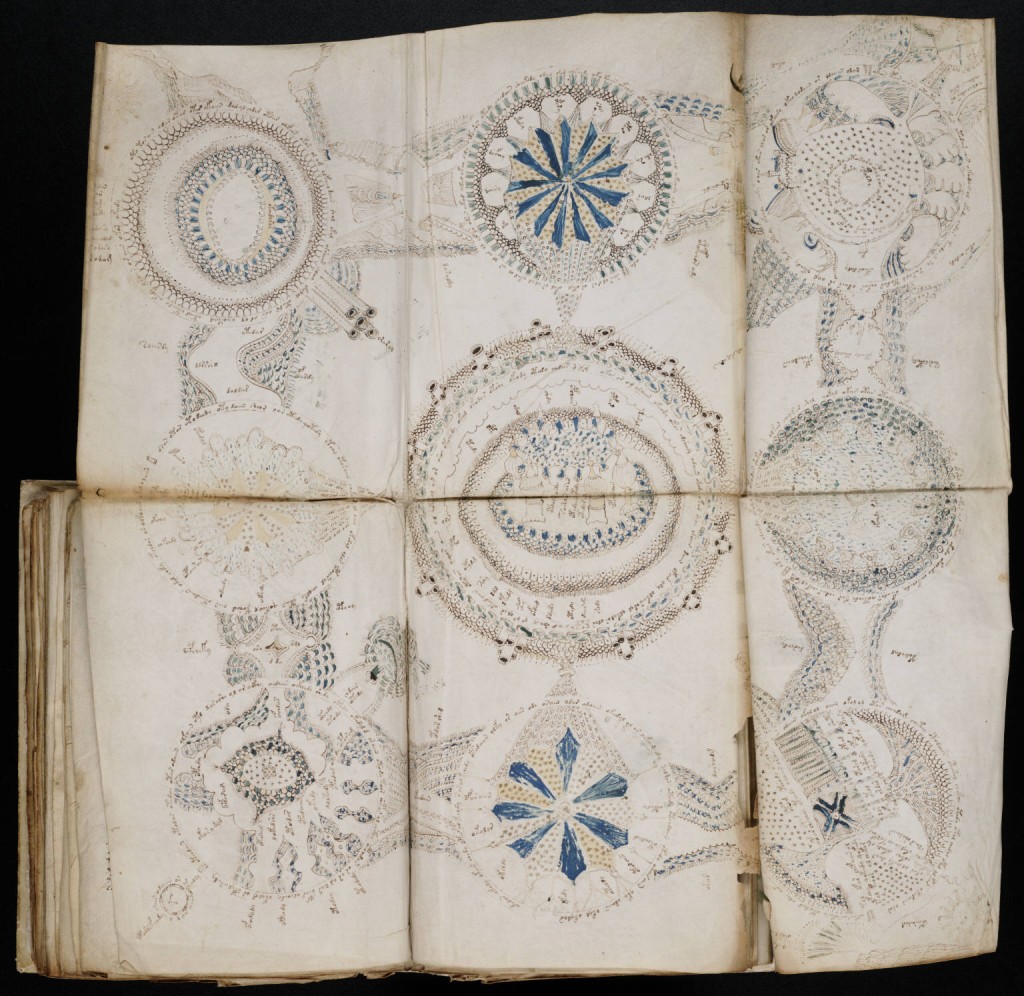
Without a real stake in the outcome of Voynich interpretation, I find the subjectivity in all these interpretations beautiful and moving. The process of constructing meaning from the many variables at play in the manuscript made me think about the myriad approaches to constructing music. Why do certain notes and rhythms follow other notes and rhythms? Is a composer’s process ever completely explainable? There might be a code at work, but how deep does that code go, and could anyone ever actually crack that code? Does it even matter that the logic of the piece is perceived while experiencing it, and why might a listener privilege objective truth in considering music?
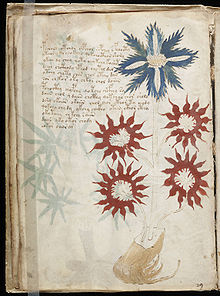 Roomful of Teeth has skillfully absorbed the means of vocal production from various cultures across the planet. What I found fascinating was how these techniques, divorced from their original cultural practice, could be assembled into some new language. How could I make sense of Tuvan throat singing layered on top of Swiss yodeling? There might be a logical grammar at work, but a beautiful assemblage of sounds might also just be a happy inspirational coincidence, never to be heard from again. The title of my piece, Such sphinxes as these obey no one but their master, comes from a letter written in 1666 by Jan Marek Marci. Marci, a Jesuit priest who possessed the book for a time in the mid-1600s, sent the book off to Athanasius Kircher in Rome, hoping he could make something of it. Kircher, known in his day as the premier Egyptologist, failed to make any headway with a translation.
Roomful of Teeth has skillfully absorbed the means of vocal production from various cultures across the planet. What I found fascinating was how these techniques, divorced from their original cultural practice, could be assembled into some new language. How could I make sense of Tuvan throat singing layered on top of Swiss yodeling? There might be a logical grammar at work, but a beautiful assemblage of sounds might also just be a happy inspirational coincidence, never to be heard from again. The title of my piece, Such sphinxes as these obey no one but their master, comes from a letter written in 1666 by Jan Marek Marci. Marci, a Jesuit priest who possessed the book for a time in the mid-1600s, sent the book off to Athanasius Kircher in Rome, hoping he could make something of it. Kircher, known in his day as the premier Egyptologist, failed to make any headway with a translation.
UPDATE: click here to listen to the performance.
Upcoming in 2013:
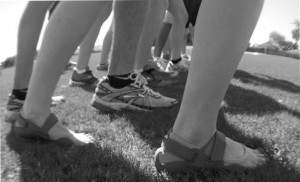 Happy 2013! A mild winter (so far) has seen much composing and much running on the streets of New Haven and Hamden. Some upcoming events on the calendar for 2013 include:
Happy 2013! A mild winter (so far) has seen much composing and much running on the streets of New Haven and Hamden. Some upcoming events on the calendar for 2013 include:
- the premiere of Such sphinxes as these obey no one but their master with Brad Wells and the amazing Roomful of Teeth on February 26th, up here at Yale.
- a performance of Push, for percussion orchestra, by the University of Kentucky Percussion Ensemble out in Lexington, KY on April 8th
- a residency in mid-April at the Levine School in Washington, DC, where I’ll lead a masterclass with their students and Pictures on Silence will perform my piece Plunge
- my first marathon, which I’ll be running in Los Angeles on St. Patricks Day (not music related, I know, but training is taking up a lot of my time and I figure the more I talk about doing it, the less I’ll consider dropping out!)
And They Sing This
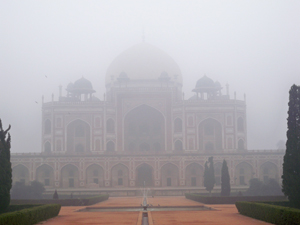 Back in November the amazing Ashley Smith helped me resurrect And They Sing This, for clarinet and electronics. And They Sing This combines the live clarinet player with two sets of samples I recorded: my great-uncle singing and talking about Polish folk music at weddings, and Humayun’s Tomb, an elaborate mausoleum in Delhi, India.
Back in November the amazing Ashley Smith helped me resurrect And They Sing This, for clarinet and electronics. And They Sing This combines the live clarinet player with two sets of samples I recorded: my great-uncle singing and talking about Polish folk music at weddings, and Humayun’s Tomb, an elaborate mausoleum in Delhi, India.
Click here to check out a recording of that performance and read more about the piece.
UPDATE: live video from the concert has now been posted on youtube.
New Recording: What I Decided to Keep
Happy Thanksgiving! Click here to check out a live recording of David Searle and the CUA chamber orchestra playing What I Decided to Keep, my new piece for chamber orchestra.
In addition to being very pleased with the performance, I was especially proud of my employers on Nov. 7th: what was suposed to be an alumni fundraising event at Carnegie Hall was, in the aftermath of Hurricane Sandy, quickly turned into a hurricane relief benefit concert down in DC. In the true charitable spirit of CUA, the concert hall was packed.
CANCELED: Wednesday, 11/7 premiere of “What I Decided to Keep” at Carnegie Hall
Due to the effects of hurricane Sandy, the Benjamin T Rome School of Music at The Catholic University has decided to cancel its concerts scheduled at Carnegie Hall this coming week. This unfortunately includes the 11/7 premiere of my orchestra piece What I Decided to Keep. Frustrating – but compared to what many others have lost, a canceled concert is small potatoes indeed. And the show does go on: they will be performing the concert on the same date and time, but down in DC at Ward Concert Hall on the Catholic University campus. If roads and weather cooperate, I expect to be there.
While we’re on hurricane related matters, if you’re in a position to help those in need in any way, please do so. People affected by the storm really need your help right now, particularly as temperatures start to drop. For those of us with power and internet, it is surprisingly easy to find ways to help: if you’re able to, take a few minutes, hunt around, and find a way to pitch in.
Within the NYC new music community, my friends at New Amsterdam Presents were hit pretty badly by the storm. You can read about their situation here.
Posted in News, Uncategorized
What I decided to keep
 Greetings from New Haven, CT! We’ve temporarily relocated to New England for the year: I’ll be teaching composition and electronic music in the music department at Yale University.
Greetings from New Haven, CT! We’ve temporarily relocated to New England for the year: I’ll be teaching composition and electronic music in the music department at Yale University.
Coming to New Haven meant moving…which of course also meant packing up an apartment that my wife and I lived in for several years. Anyone who has moved as an adult has surely had the archeological experience of unearthing several incarnations of their life when packing. While still embracing my packrat tendencies and filling many boxes with stuff (and parting with 0 musical instruments), I am proud to report that many things were purged (ok, some of the broken Casio keyboards). And then there’s the consideration of mental baggage that one accumulates from living in various places: to compound this, I’m coming back to a school where I did my masters ca. 10 years ago.
All of this brings me to the piece that I gave most of my attention to over the summer: what I decided to keep, composed for David Searle and the Catholic University Orchestra. They’ll be premiering the piece at Carnegie Hall on 11/7. The piece is actually scored for something more like a chamber orchestra: smaller sections of violins and cellos, along with 2 double basses, are augmented with single winds and brass, and a piano. Within the strings, I wanted to have a thicker section sound, but also the ability to treat each player like a soloist (I also wanted to exclude the violas. Insert your favorite viola joke here).
As a composer with one foot in academia, I work at a far less frantic pace during the summer: with my teaching obligations in mothballs until September, I’ve got so much more time to consider compositional issues that I just don’t have the mental space to hang out with for the other 9 months. In addition to considering my output while a resident of DC for the past four years, I also found myself reflecting back on my time at Yale: specifically, the year I studied with Martin Bresnick. At the time, I had one of my most formidable cases of writers block. I had such little music to show in my lessons, that Martin and I may have in fact spent more time talking about other people’s music. Remembering those lessons, I came back to one composer and piece in particular: Béla Bartók’s 5th string quartet. what i decided to keep owes a great debt to this piece, in its linear succesion of events, and use of certain musical materials.
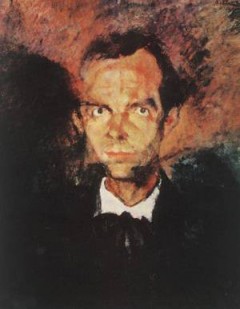 Truth be told, very little is a direct quote from ol’ Béla, but I’d like to think he and I share a similar affinity for musics not typically heard in a concert hall (in my case, funk and prog rock). The piece itself is dedicated with admiration and affection to Martin, who was consistently patient with my compositional hesitance that year. As I reflect back on my four years so far at Catholic University, I can also see that many of the ways I try to create a positive environment for my own students owes much to Martin’s example.
Truth be told, very little is a direct quote from ol’ Béla, but I’d like to think he and I share a similar affinity for musics not typically heard in a concert hall (in my case, funk and prog rock). The piece itself is dedicated with admiration and affection to Martin, who was consistently patient with my compositional hesitance that year. As I reflect back on my four years so far at Catholic University, I can also see that many of the ways I try to create a positive environment for my own students owes much to Martin’s example.
HCL residency in Chicago
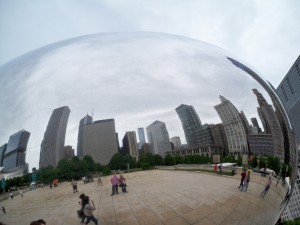
I’m happy to announce that I’ll be in-residence at High Concept Labs, a new arts space in downtown Chicago, in June.
Click here for info on the project I’ll be working on over the coming year with the Spektral Quartet. While in Chicago, I’ll be trying to hunt out interesting soundscapes to record for this piece, and other upcoming projects.
May Performances:
As the semester comes to a frantic close, I’ve got two performances coming up in the next few weeks that I’m really excited about: Trio Chiaroscuro comes to DC on Tuesday, 5/1 to play Tudo Bem? Tudo Bom? at the Atlas Theatre (click here tickets and info); and Bounce, my new orchestra piece, will be read by David Alan Miller and the Albany Symphony on May 17th as part of their American Music Festival.
Summertime projects include a piece for two harps for another chamber group with a multi-syllabic Italian name (the Sprezzatura Duo!), a string quartet for the Chicago-based Spektral Quartet, and a temporary relocation to New Haven, CT for the 2012/2013 academic year.
Posted in News, Uncategorized
How you doing?
Head over to New Music Box to check out my blog posts from the Buffalo Philharmonic Earshot readings. You can read post one out of four here. My thoughts on the whole experience are up there to read; to summarize, I’ll just say “orchestration lesson on steroids”. Matt Kraemer and the orchestra did a fantastic job with Bounce, and a big thank you is also due to the folks at the ACO for putting together a amazingly useful week of seminars.
The Trio Chiaroscuro premiered my new flute, bassoon and piano trio Tudo Bem? Tudo Bom? at the end of January. The title is the Portuguese/Brazilian equivalent of “how you doing?” (he says in his best north-Jersey Tony Soprano accent.) While there are a lot of tightly coordinated rhythmic grooves in Tudo Bem? Tudo Bom?, I wasn’t really going for anything musically Brazilian in the piece…it’s actually inspired by the phone conversations I have with my wife while one of us is traveling; a playful kind of conversational capoiera where we fit all of the minutes of our time with details from our day. Check out the video below (assembled from amateur capoiera footage and a live performance by Trio Chiaroscuro), or click here for more info on the piece.

